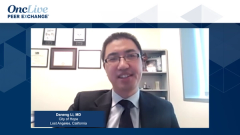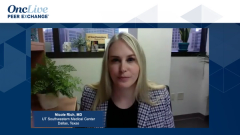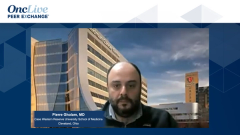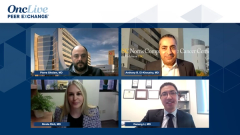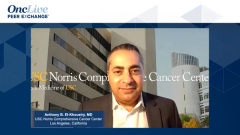
Phase 3 HIMALAYA Study in Advanced HCC
Dr Daneng Li reviews updated safety and efficacy results of durvalumab plus tremelimumab from the phase 3 HIMALAYA study in frontline unresectable HCC.
Episodes in this series

Anthony B. El-Khoueiry, MD: Dr Li, would you also review the data from HIMALAYA as presented at the 2022 ASCO GI [American Society of Clinical Oncology Gastrointestinal Cancers Symposium]?
Daneng Li, MD: Yes. Similar to COSMIC-312, this was 1 of the long-awaited trials for our patients with frontline unresectable HCC [hepatocellular carcinoma]. Here, we’re trying to target with a different mechanism of action. In the prior 2 studies that we mentioned, IMbrave150 and COSMIC-312, we’re targeting the combination of VEGF with an immune checkpoint inhibitor. In HIMALAYA, it’s looking at dual immune checkpoint inhibitors for HCC. This was based off earlier work in the phase 1 setting as well as a phase 2 expansion study looking at the combination of durvalumab, a PD-L1 inhibitor, plus tremelimumab, a CTLA4 inhibitor. Based off preliminary work, it showed that there was an estimated response rate of 20% in this population. It was felt that this was a potential synergistic regimen that could be tested in the phase 3 setting to go up against our prior standard of care, sorafenib.
The HIMALAYA trial was a large phase 3 trial that included over 1300 patients. It was much larger than many of the other clinical trials that we’ve had in the HCC field. Initially, the trial was designed comparing sorafenib as the control arm vs single-agent durvalumab vs the combination of tremelimumab at 75 mg for a total of 4 doses plus continuing with durvalumab. On initial analysis and earlier work, it was shown that the 75-mg dosing of tremelimumab wasn’t necessarily the ideal dose to help the patient, so the protocol underwent an amendment, essentially changing into the STRIDE [single tremelimumab regular interval durvalumab] regimen with a priming dose of tremelimumab at 300 mg. That’s a much higher dose of CTLA4 as a 1-dose regimen in the beginning during the first cycle of treatment followed by durvalumab.
It continued to enroll patients in that arm, whereas the 75-mg dose of the tremelimumab arm with durvalumab was closed. Ultimately, you have 3 arms with the tremelimumab at 300 mg plus durvalumab vs durvalumab vs sorafenib. The primary end point of this study was overall survival [OS]. The study met its primary end point of overall survival when you compare the single dose of tremelimumab plus durvalumab vs sorafenib. The median overall survival for the combination of durvalumab-tremelimumab was 16.4 months; for sorafenib, it was 13.8 months. They looked at single-agent durvalumab vs sorafenib from a noninferiority standpoint. That met its primary outcome in terms of noninferiority because durvalumab had an immediate overall survival of 16.6 months vs sorafenib of 13.8 months.
Interestingly, when we looked at progression-free survival [PFS], there was no difference with either durvalumab by itself or the single dose of tremelimumab plus durvalumab vs sorafenib. Median progression-free survival was about 4 months for sorafenib vs 3.65 months for durvalumab and 3.78 months for tremelimumab. Objective response was very consistent with the earlier studies. The combination had an objective response rate of 20%, and single-agent durvalumab had an objective response rate of 17%. That’s much higher compared with sorafenib. It causes some pause in the sense that it met its primary end point in terms of overall survival, but it didn’t meet its primary end point in terms of median progression-free survival, highlighting that potentially not enough patients derived significant tumor control in this population to translate to that PFS.
It will be interesting to look at the full data to see where we incorporate this regimen moving forward. It presents another option for us, given that it’s not targeting VEGF and has a completely different adverse-effect profile for our patients. But we need to take a deeper dive into the data to determine where it stands in the treatment landscape right now vs the new standard in terms of the combination of atezolizumab plus bevacizumab.
Anthony B. El-Khoueiry, MD: Thank you for the excellent summary. I’ll add a couple of things to make it clear for the audience. The study was powered to compare the tremelimumab-durvalumab combination with sorafenib. That’s 1 comparison. The second comparison was durvalumab to sorafenib. The study wasn’t powered to compare the combination, which is tremelimumab-durvalumab to durvalumab. That’s just a caution for statistical design. That’s 1 issue. The second issue is this study excluded patients with main portal vein thrombosis. The REFLECT trial with lenvatinib did that as well, whereas the atezolizumab-bevacizumab IMbrave150 study didn’t exclude main portal vein thrombosis. Those are some caveats to consider as well.
There could be many potentially debatable reasons for the lack of benefit with PFS. There are some theories, including whether that could simply be because the study only includes I/O [immuno-oncology]–I/O therapy. There’s no combination with a VEGF or chemotherapy agent. The curve separated later, speaking to your point that the disease control was lower and the benefit happened later. It’s intriguing that this study had quite long follow-up, and there was almost a 31% overall survival rate at 36 months with the tremelimumab-durvalumab combination. It’s very interesting that we’re at a time where we’re seeing advanced HCC patients have a 30% OS rate at 3 years. It’s quite impressive and intriguing. We’re also awaiting longer follow-up with the other studies, including atezolizumab-bevacizumab. We have 2 first-line options with some nuances and caveats on how they’re going to be used. Maybe we’ll come back to that a bit later.
Transcript Edited for Clarity


